
Small communities depend on sports as a strong social glue to link generations of people living in them. Athletic events define local identity and social relationships, so they become more than just games—they reflect common experiences.
From neighborhood baseball clubs to high school football, sports create venues where people assemble, encourage one another, and form deep bonds. These sporting events become important venues for social interaction, personal growth, and community pride, transcending basic competitiveness.
Social Connections Through Athletic Events
Sports fans who use 1xbet apk download for Android know how local athletic events foster community ties. Small-town sports events take the stage for local residents. Local high school events draw many generations and complete families. Knowing one another, viewers create chances for social contacts outside of the athletic event. Rivalries among neighbours generate enthusiasm and community involvement.
Local sports provide common emotional experiences that bind people of a community. Athletic support brings people who might not interact in other environments, common ground. Small-town sporting events turn into social calendars for planning communal gatherings. Through these shared sporting events, friendships grow, conversations begin, and community ties get stronger.
Economic Impact of Local Sports
For tiny communities, local sports bring about major economic activity. Games in amateur leagues and high schools draw people who patronize nearby businesses. Sporting events open doors for nearby businesses, motels, and eateries. Sporting facilities turn into significant investments in community infrastructure. Many times, local companies fund teams to establish more economic relationships.
Weekend tournaments bring small communities to life as thriving economic hubs. Sales of sporting goods help local businesses. Athletic successes inspire community pride that draws prospective neighbours and commercial development. Small communities apply sports as a means of communal development and economic recovery.
Youth Development and Community Values
Small-town young people depend much on sports programs. Local sports teach life lessons including discipline, endurance, and teamwork, as well as basic abilities. Through sports, young athletes pick up communal values. Coaches start to become significant mentors guiding both athletic and personal growth. Sports provide ordered settings for developing social skills and leadership.
Members of communities devote a lot of emotional energy to help young athletes. Local teams start to be venues for imparting significant personal and social ideals. Young people’s strong communal ties are developed in part by athletic experiences. Sports programs advance personal development and learning objectives.
Cultural Identity and Community Pride
Small-town sports start to become strong statements of local cultural identity. Sporting success generates shared events that bind individuals of a community.
Local teams reflect historical traditions and more general community ideals. Sporting success creates common emotional events that deepen ties within a community.
Sporting support helps community members form close emotional bonds. Sporting activities become venues for storytelling that upholds local customs and history. Local sportsmen start to be inspiration sources and community leaders. Sporting successes help to tell good stories about community potential and power.
Generational Connections and Social Memory
Sports provide special forums for small-town residents of many generations to interact. Parents, grandparents, and kids all have athletic customs and memories.
Local sports history starts to take centre stage in communal narrative. Veteran sportsmen stay close to their communities by continuous participation. Sports offer chances for information sharing between generations.
Members of the community relate tales of former sporting successes. Local sports museums and historical exhibits help to preserve shared sporting memories. Athletic customs develop into significant cultural archives tying previous and present community experiences together.
Diversity and Social Inclusion
Small town sports offer great venues for encouraging social integration. Sporting events set venues where people from many backgrounds engage. Sports events encourage mutual understanding and assist in breaking societal barriers. Local teams start to create settings honouring unique differences.
Community sports leagues give more and more importance to establishing friendly and inclusive surroundings. Sportsmen pick up vital lessons about collaboration and respect. Sports give controlled environments for social development and interaction. Community sports events help to further more general social integration objectives.
Technology and Community Sports Transformation
Small town sports events are changed by digital technologies. Online channels provide fresh means of linking fans of sports. Fans may post local athletic events on social media. Virtual training courses help sports to be more accessible. Small towns can now link with larger sporting networks because of technology.
Online sites help amateur leagues and local athletic events. New approaches of tracking performance and distributing sports experiences are offered by digital tools. Small-town sports teams generate more interesting communal settings using technology.
Resilience and Community Adaptation
Sports start to become essential instruments for community adaptation and resilience. Sporting events enable communities to handle social and financial issues. Local sports help to build good stories in trying conditions. Collective optimism and inspiration come from team successes. Sports offer methodical means of addressing community issues.
Athletic settings impart important lessons about tenacity and teamwork. Programs for community sports help to assist more general social and economic development plans. Sports provide small towns with venues for community healing and change.







